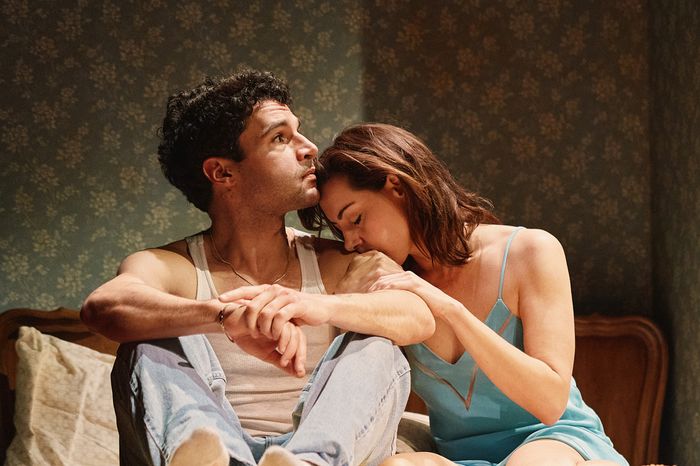
John Patrick Shanley, born in the Bronx, often writes about the same characters Bruce Springsteen sings about: characters stuck in death-trap ’burbs, bruised and battered, dull-eyed and empty-faced, scared and lonely riders who just can’t face themselves alone again. The tragedy of these hungry and hunted American brothers — and sisters — is that, unlike the Boss, they’re not poets. They struggle to convert the madness in their souls into language, but, time and again, it bursts out as violence instead. They can’t articulate, so they attack.
Characters like these — working-class, usually white, tortured, spoiling for a fight — aren’t exactly the flavor of the moment among playwrights. But when it comes to producing, small-cast shows with a celebrity draw definitely are. Jeff Ward’s new production of Danny and the Deep Blue Sea sits at the center of that Venn diagram. A passion project for first-time director Ward and his friend and fellow actor Christopher Abbott, and starring Abbott and Aubrey Plaza (of Parks and Recreation, Legion, The White Lotus, etc., who’s currently doing theater boot camp as Patti LuPone’s roommate), Shanley’s play about claws-out love between two damaged strangers turns 40 years old this year, and it’s got the 1980s in its DNA: It’s aggressive, titillating, apolitical, and so earnestly raw that it’s almost ridiculous. And, in a strangely exciting way, it mostly holds up.
The fact that it does so is largely due to Abbott. Though Ward and his set and lighting designers, Scott Pask and John Torres, have tricked out the Lucille Lortel with two different full sets, a moving wall, LED frames, string lights, snow — the works — Danny still lives or dies by its actors. (Undergrads looking for something so intense to do for scene-study classes love it.) As Danny and Roberta, the two busted-up souls at its center, performers need to be able to play big — this is the writer who brought us “Johnny has his hand! Johnny has his bride!” — and Abbott has ready access to that exhilarating, almost embarrassing, opera-in-a-dirty-white-undershirt sense of magnitude. With bloodied knuckles, a perpetually knitted brow, and a hand that flutters over his chest betraying the riot within, he nails Danny’s explosive, preemptive fury, but also his guilelessness. He’s a confused child in a bruiser’s body, a windmill of fists who’d rather “fight everybody in the whole fuckin’ Bronx” than reveal his own gaping need or let himself be needed.
Abbott wears Danny easily and at the requisite scale — his thick accent, his hair trigger, his gnawing befuddlement and vulnerability. It’s because we can see the lost boy inside “the Beast” (Danny’s nickname at his construction job) that we don’t completely recoil when he admits to a stranger in a dead-end bar, “I think I killed a guy last night.” That stranger is Roberta (Plaza, whose hard stare could kill houseplants), a single mother with hidden traumas of her own. The play is a simple three acts over 80 minutes: Two combustible elements meet, a night of chemical reaction occurs, and the morning after reveals whether that reaction has in fact produced something new. The play’s usually dropped subtitle, An Apache Dance, refers to a form of physically rough pas de deux from turn-of-the-century Paris, often associated with the power play between prostitute and pimp. It’s a desperate, thrashing duet, and it requires evenly matched, extremely daring partners. Though Roberta’s name doesn’t make the title, she’s there: She’s the one who opens Danny’s eyes to the deep-blue sea — to the literal fact of it right around the corner, and to the ocean as a dream-metaphor for all they’ve been unable to express, all they’ve considered themselves unworthy to hope for.
Though she’s certainly daring, Plaza hasn’t yet turned Roberta into a match for Danny. She stands up to him, throws abuse at him, and keeps him on the hook, all as the script demands, but she doesn’t expand to fill up the demanding, almost Fauvist excesses of the text. It’s not a matter of literal size — it’s a matter of the body as a fully charged-up power station. Roberta needs to crackle and seethe. She needs to take up dramatic space. Vocally, emotionally, physically, she needs to feel as dangerous, and as in danger, as Danny does. If she’s sometimes a wary stray cat, she’s just as often — and always, in essence — a panther. Plaza is tough, but she tends to fold inwards. The tart deadpan she’s deployed onscreen to great effect, both comic and not, here makes her armor just a little too thick, her distance from Roberta’s torment just a little too wide. While Abbott rolls around in Danny like a dog in something foul and fun, pulling off the feat of playing a character who’s not dumb but who also ain’t smart, Plaza consistently feels more sophisticated than her role.
She’s game, though. Ward’s big innovation is, between Acts One and Two, to stage the play’s subtitular dance, and both Plaza and Abbott hurl themselves all the way into Bobbi Jene Smith and Or Schraiber’s choreography. Their impassioned duet is lit beautifully by Torres and compellingly scored by sound designer Kate Marvin, who slides from the recognizably romantic strains of Otis Redding into darker, more abstract textures. When the choreography follows suit — pushing toward the angular and Expressionist — the sequence ascends to some truly exciting heights. It also has some low lows (onstage simulated sex Just 👏 Never 👏 Works), but the roughly 65 percent of it that leaps past the literal is thrilling.
Danny is famous for its slaps, chokes, and tirades, but underneath the brassy, broken Bronxiness, the play has the smushable underbelly of a baby pit bull. Shanley is a romantic, and in Ward’s production, the more tender moments are among the strongest. In the moonlit second act (well, lit by the big moon-shaped light on Roberta’s pigeon-keeping neighbor’s roof), the blushing now-lovers stumble their way through “[being] romantic to each other.” Giving and receiving sweetness is a terrifying foreign land, and Abbott and Plaza navigate it poignantly together, with Plaza able to stop pushing and quietly shine. “You got friendly ears,” Roberta tells Danny. “They make me feel friendly … like, I wanna shake hands.” “You got a nice nose,” says Danny. “It looks right at ya, your nose, and it says ‘Hello!’” Both Roberta and Danny still live with parents (Roberta right upstairs from a father who’s the source of her agony), and as Plaza and Abbott sit together on a tousled Murphy bed and attempt to find the words for affection, that sense of the characters as trapped children returns. Their adulthoods, their vocabularies, their ability to see themselves as whole people whose dreams and desires are more than hopeless and shameful — it’s all been cruelly stunted. In the end, what Ward, Abbott, and Plaza access is that Danny and the Deep Blue Sea isn’t really a play about violence at all, but about absolution. It ends in the morning, with the new possibility to show a little faith, ’cause there was magic in the night.
Danny and the Deep Blue Sea is at the Lucille Lortel Theatre.





